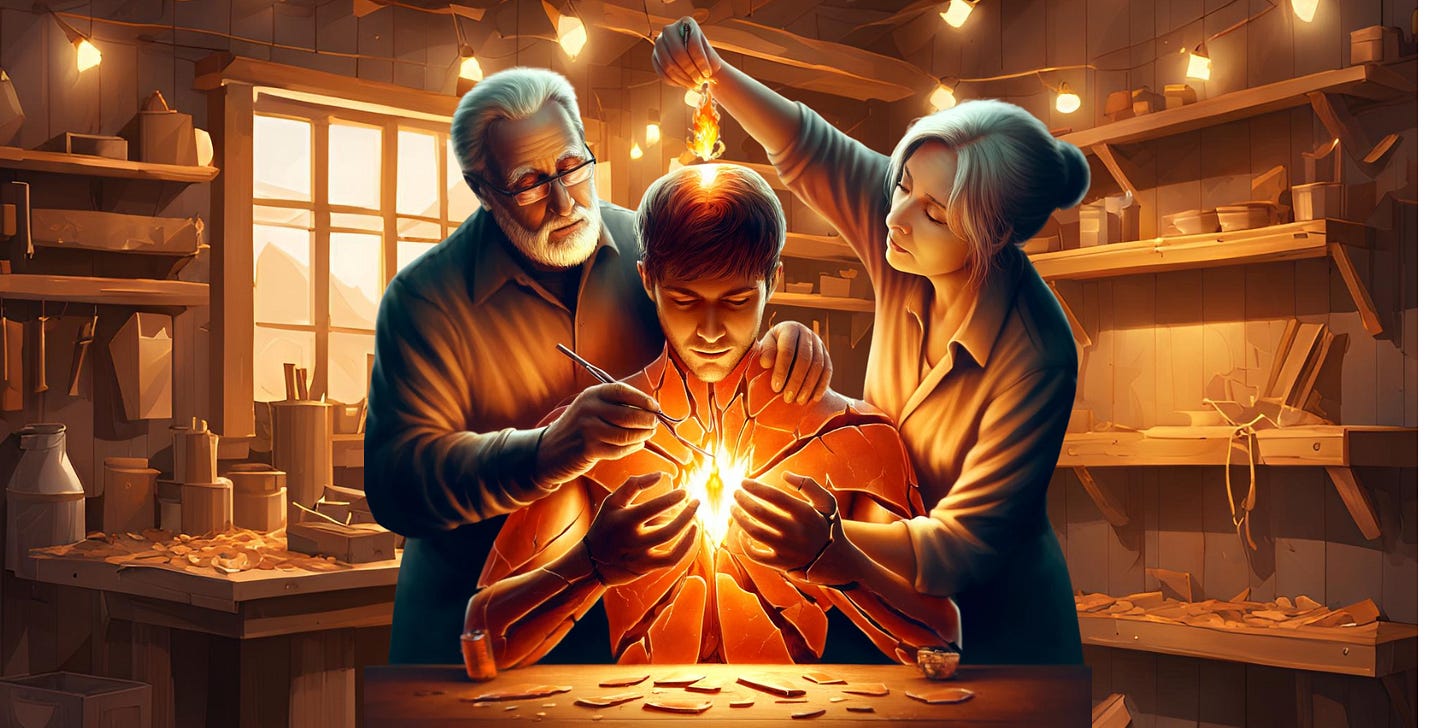When Colin Powell famously referenced the Pottery Barn rule—"You break it, you own it"—he was warning of the consequences of unchecked actions. It's a rule that resonates far beyond the political sphere. As part of Generation X, I see it as an unwelcome mirror reflecting the world we've helped shape. Our decisions—or lack thereof—have left subsequent generations with a fractured world. Yet, instead of collectively owning what we broke, we've often resorted to blaming them for struggling in the mess we left behind.
The good news? We have a unique opportunity to fix it. Not by waiting for sweeping reforms or a savior to step in, but through individual engagement. We don't need a hero. We need to be the hero.
The Era of Abdication
As with anything, the first step in repairing the problem is understanding it. Looking back at raising my own kids and reflecting on my parenting decisions, both good and bad, I feel that Generation X abdicated responsibility in several key areas. This wasn't because we were intentionally negligent or bad parents—the prevalence of influence from the very entities to whom we abdicated our control definitely plays a part. Most of the time, our intentions were good, but the road to Hell, as they say, is paved with those, and the current situation is the outcome.
Technology: From Baby Einstein to TikTok
We embraced technology as a way to enrich lives. Baby Einstein DVDs were hailed as revolutionary tools to make kids smarter. Smartphones became lifelines of convenience and connection. But we failed to see the dangers lurking beneath the surface. Social media platforms turned into dopamine factories, designed to addict rather than enrich. Algorithms exploit attention spans, leaving kids and adults alike trapped in endless scrolling.
We handed over control to Big Tech, trusting it to act responsibly. It didn't. And now, generations are battling screen addiction and tech-induced anxiety because we didn't set limits on our kids or, more importantly, the technology providers.
Food and Nutrition: Convenience Over Care
Big Food and Big Agra shaped our dietary habits, prioritizing convenience and profits over health. Processed foods became staples. Fast food was an easy solution for busy parents. In exchange, we got foods engineered for addiction rather than nutrition. We rarely stopped to consider the long-term effects on our children's health.
The result? A crisis of obesity, diabetes, and chronic illness. And while we point fingers at younger generations for their poor eating habits, we forget who modeled those behaviors.
Helicopter Parenting and Overprotection
Looking back, it's clear how our desire to shield our children from every bump in the road led us astray. We couldn't bear the thought of them struggling—even a little—so we hovered. If a teacher gave a tough grade, we were on the phone the same day questioning the fairness of the assessment. When coaches made lineup decisions, we pressured them to give our kids more playing time, worrying that sitting on the bench might bruise fragile self-esteem. We enthusiastically handed out participation trophies, hoping to spare them from any painful sense of loss or failure.
At the time, these actions felt loving, even necessary. We believed we were supporting our children, building their confidence, and protecting them from harm. But now, we see the unintended consequence: kids who grew up without ever having to struggle or find their own solutions. Anxiety soared as they entered college or the workforce, facing a world where parents couldn't smooth every path. They had been well-educated yet were unprepared for the inevitable disappointments and setbacks adulthood brings. By never letting them fail, we also robbed them of the chance to learn from failure.
In hindsight, our constant interventions—though done out of love—ended up undermining the resilience and problem-solving skills that come from weathering life's small challenges. We can't change the past, but we can recognize these mistakes and encourage the next generation of parents to give their children room to stumble and recover—because it's in the struggle that they grow strong.
Voting for Corporate Interests and Consumerism
In hindsight, we recognize how our votes helped create a legislative landscape that frequently placed corporate profits above individual welfare. Eager for economic growth, we supported policies that chipped away at worker protections and allowed wealth disparities to deepen. At the time, it seemed logical—strong companies, strong economy. But we failed to see how short-term gains could eclipse the long-term health of our communities. Our complacency allowed power to consolidate among a few, widening the gulf between corporate success and the well-being of everyday people.
Simultaneously, we were swept up in a culture of relentless consumption, chasing the latest products and conveniences without considering the broader impact of our choices. We wanted everything faster, cheaper, and more abundant, inadvertently encouraging business practices that prioritized volume and profit over sustainability and quality. While we reveled in novelty and ease, the costs—environmental strain, labor exploitation, and growing social disparities—remained hidden beneath our collective desire for ever-more stuff. Looking back, it's clear how our unchecked consumerism fueled the very systems that placed profit above progress.
A Broken Inheritance
The younger generations didn't just inherit the world we created; they've been shaped by it. They watched us endure layoffs, financial instability, and crushing workloads with little reward. They saw loyalty to corporations repaid with expendability. They lived through bubble after bubble, where families lost everything while corporations were bailed out.
It's no wonder they reject traditional systems. Quiet quitting, the push for work-life balance, and their prioritization of mental health over financial gain aren't signs of laziness or entitlement. They're rational responses to a broken system.
But instead of recognizing this, we've often blamed them. We call them unmotivated or self-centered without acknowledging the lessons we taught them through our own struggles. Their behavior is a mirror, reflecting what they've seen and learned from us.
Engagement That Matters
Fixing what's broken doesn't require sweeping reforms—it requires rebuilding trust and connection through deliberate, meaningful actions. I could list a dozen tasks—listen more, put your phone down, model better habits—but none of it matters unless younger generations see us as valuable partners in success. They are bombarded with messaging and alternatives. Until we market the value of collaboration with us as better than other options, no tactics will stick.
We need to demonstrate that working together isn't just necessary—it's advantageous. When they see us as allies who bring experience, perspective, and willingness to adapt, we move from being part of the problem to being part of the solution. We have to earn their trust by showing, not just telling, how collaboration with us makes their lives better.
If we fail to act, we risk leaving behind a society divided by distrust, apathy, and resentment. A generation abandoned will either rebel or withdraw, and both paths lead to chaos. We have seen this in action in recent elections where young men as example gravitated to the performative instead of the purposeful.
But there's hope. Heroism doesn't require saving the world in one swoop. It's about small, intentional actions that build trust, foster collaboration, and create a better path forward.
Every generation has its role, and this is ours. We broke it, and now we have a chance to fix it. Not through grand reforms, but through small, meaningful actions that show the way forward.
We don't need a savior. We just need to step up.
This will not make me rich but helps me keep up the fight. It also lets you show your support for retaking America with a movement of sanity and practicality.



